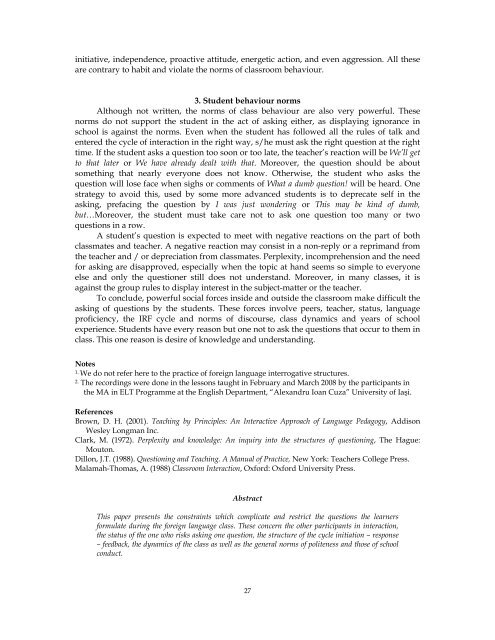Create successful ePaper yourself
Turn your PDF publications into a flip-book with our unique Google optimized e-Paper software.
initiative, in<strong>de</strong>pen<strong>de</strong>nce, proactive attitu<strong>de</strong>, energetic action, and even aggression. All these<br />
are contrary to habit and violate the norms of classroom behaviour.<br />
3. Stu<strong>de</strong>nt behaviour norms<br />
Although not written, the norms of class behaviour are also very powerful. These<br />
norms do not support the stu<strong>de</strong>nt in the act of asking either, as displaying ignorance in<br />
school is against the norms. Even when the stu<strong>de</strong>nt has followed all the rules of talk and<br />
entered the cycle of interaction in the right way, s/he must ask the right question at the right<br />
time. If the stu<strong>de</strong>nt asks a question too soon or too late, the teacher’s reaction will be We’ll get<br />
to that later or We have already <strong>de</strong>alt with that. Moreover, the question should be about<br />
something that nearly everyone does not know. Otherwise, the stu<strong>de</strong>nt who asks the<br />
question will lose face when sighs or comments of What a dumb question! will be heard. One<br />
strategy to avoid this, used by some more advanced stu<strong>de</strong>nts is to <strong>de</strong>precate self in the<br />
asking, prefacing the question by I was just won<strong>de</strong>ring or This may be kind of dumb,<br />
but…Moreover, the stu<strong>de</strong>nt must take care not to ask one question too many or two<br />
questions in a row.<br />
A stu<strong>de</strong>nt’s question is expected to meet with negative reactions on the part of both<br />
classmates and teacher. A negative reaction may consist in a non-reply or a reprimand from<br />
the teacher and / or <strong>de</strong>preciation from classmates. Perplexity, incomprehension and the need<br />
for asking are disapproved, especially when the topic at hand seems so simple to everyone<br />
else and only the questioner still does not un<strong>de</strong>rstand. Moreover, in many classes, it is<br />
against the group rules to display interest in the subject-matter or the teacher.<br />
To conclu<strong>de</strong>, powerful social forces insi<strong>de</strong> and outsi<strong>de</strong> the classroom make difficult the<br />
asking of questions by the stu<strong>de</strong>nts. These forces involve peers, teacher, status, language<br />
proficiency, the IRF cycle and norms of discourse, class dynamics and years of school<br />
experience. Stu<strong>de</strong>nts have every reason but one not to ask the questions that occur to them in<br />
class. This one reason is <strong>de</strong>sire of knowledge and un<strong>de</strong>rstanding.<br />
Notes<br />
1. We do not refer here to the practice of foreign language interrogative structures.<br />
2. The recordings were done in the lessons taught in February and March 2008 by the participants in<br />
the MA in ELT Programme at the English Department, “Alexandru Ioan Cuza” University of Iaşi.<br />
References<br />
Brown, D. H. (2001). Teaching by Principles: An Interactive Approach of Language Pedagogy, Addison<br />
Wesley Longman Inc.<br />
Clark, M. (1972). Perplexity and knowledge: An inquiry into the structures of questioning, The Hague:<br />
Mouton.<br />
Dillon, J.T. (1988). Questioning and Teaching. A Manual of Practice, New York: Teachers College Press.<br />
Malamah-Thomas, A. (1988) Classroom Interaction, Oxford: Oxford University Press.<br />
Abstract<br />
This paper presents the constraints which complicate and restrict the questions the learners<br />
formulate during the foreign language class. These concern the other participants in interaction,<br />
the status of the one who risks asking one question, the structure of the cycle initiation – response<br />
– feedback, the dynamics of the class as well as the general norms of politeness and those of school<br />
conduct.<br />
27












